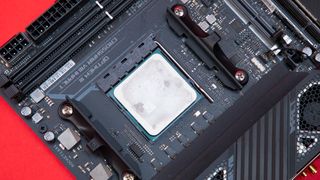AMD Ryzen CPUs are becoming so dominant, Intel’s Comet Lake chips have an uphill struggle
Ryzen 3000 goes from strength to strength – backed up by robust Ryzen 2000 sales

AMD Ryzen processors continue to dominate on the desktop, now representing the majority of sales at top retailers, according to details revealed as part of the firm’s latest financial results – and that must be a major concern for Intel, which is attempting to strike back with its freshly revealed Comet Lake CPUs.
On an earnings call, AMD’s chief executive Lisa Su said that the company has now captured “more than 50% of premium processor sales at many top global etailers”, with Ryzen 2000 and 3000 chips putting in seriously strong performances.
- Intel vs AMD - who makes the best CPUs?
- Here are the best processors
- Best gaming laptops of 2020
That’s no surprise given some of the startling figures we’ve seen from online retailers like German site Mindfactory in recent times, and indeed this isn’t the first time we’ve heard this sort of boast from the CEO. Just turn the clock back to Q3 2017, when Su let us know that Ryzen desktop CPU sales accounted for around 40 to 50% of units shifted at some online retailers.
So we can observe the change in language and much stronger terms used in the current CPU market, with Su now saying ‘many’ top retailers rather than ‘some’, and the sales percentage quoted being over 50%.
As Seeking Alpha reports, Su further observed: “Client processor revenue grew significantly year-over-year, as strong Ryzen processor demand resulted in significant double-digit percentage increases in unit shipments and ASP. As a result, we believe we gained client unit market share for the 10th straight quarter.”
10 straight quarters would be two-and-a-half years, which is quite some time to be gathering momentum.
It’s also interesting that the CEO highlighted that Ryzen 2000 CPUs are still very much part of AMD’s success story, offering an even stronger value proposition after the launch of Ryzen 3rd-gen chips. The Ryzen 5 2600 and 2600X, along with the Ryzen 7 2700X, remain fairly popular processors at least going by Mindfactory’s recent stats.
Get daily insight, inspiration and deals in your inbox
Get the hottest deals available in your inbox plus news, reviews, opinion, analysis and more from the TechRadar team.
Mobile momentum
AMD’s chief executive also observed that AMD was forging ahead with laptop chips as well, and that’s what will really worry Intel – Ryzen 4000 mobile CPUs are a major threat to Intel’s dominance in the notebook arena.
Su said: “In mobile, unit shipments increased by a strong double-digit percentage year-over-year. We set a record for quarterly notebook processor revenue, driven by sustained demand for our previous generation offerings and the ramp of the first Ryzen mobile 4000 design wins.”
She added that the initial batch of consumer notebooks which are powered by Ryzen 4000 CPUs had launched to “strong demand”, and that’s not surprising – we’ve been very impressed with the performance of the chips ourselves, and there are some stormingly competitive deals to be had on notebooks running with them.
Ryzen’s desktop dominance – which is apparently going from strength to strength – has doubtless been a big worry for Intel in recent times, but it’s likely nothing compared to the furrowing of brows that must be going on at the prospect of losing laptop turf to AMD.
Lisa Su also touched on graphics cards, noting that unit shipments for Q1 increased by double-digits compared to the same time last year, and revenue did the same, mainly driven by RX 5000 products. Sales of discrete GPUs for desktop PCs were mainly fuelled by Navi graphics cards along with RX 500 products at the budget end.
As we also heard from the earnings call, Lisa Su confirmed that next-gen RDNA 2 graphics cards are still on track for release in late 2020, as are Zen 3 (next-gen Ryzen 4000 desktop) processors.
- Check out the best gaming PCs of 2020
Via PC Gamer
Darren is a freelancer writing news and features for TechRadar (and occasionally T3) across a broad range of computing topics including CPUs, GPUs, various other hardware, VPNs, antivirus and more. He has written about tech for the best part of three decades, and writes books in his spare time (his debut novel - 'I Know What You Did Last Supper' - was published by Hachette UK in 2013).
Most Popular

